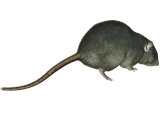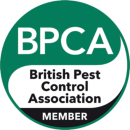
It’s that time of year when mice and rats become very tempted by the warmth and shelter humans have on offer in and around their homes. Colin Campbell of Pest Professionals is on hand with advice on how to deal with rats and mice.
Britain is home to 14 species of rodent, and we come into contact with them most at this time of year as the temperature falls, and they become tempted by the warmth and easy pickings to be found around our homes.
Mice are extremely destructive. Anyone who has had mice in their garage or shed will testify as to how costly their gnawing habits are, and how quickly large colonies can establish. Mice also carry and spread diseases such as salmonella and need to be dealt with when in close contact with humans very quickly.
Generally speaking we are most likely to come across the House Mouse, which has a brown to grey back with a lighter underside and a tail slightly shorter in length than its body. They only live for a few months, but are sexually mature inside eight weeks and will have several litters in their lifespan. They usually nest indoors and are very good climbers.
As well as damaging property, they often gnaw through electrical cables and are the cause of numerous house fires as a result. A professional baiting, trapping and proofing service is normally required to eradicate the problem.
As for rats, well not even we pest controllers especially like getting close up and personal with them! But of course we have to.
In the UK you are likely to come across the Brown Rat (common or sewer rat) and the Black Rat (ship rat).
The Black Rat has been with us the longest and has been found in digs in the city of London dating back to the third century. It lives only for about a year, but is sexually active in 2-3 months. Its tail is longer than its body and it’s a very good climber, and can readily enter loft spaces.
The slightly bigger brown rat originated in Asia and was first recorded in Europe only in the 18th century. Its tail is slightly shorter than its body. The brown rat often lives in the ground and in sewers and drains. Rats eat just about anything, and need an easily available source of water.
Rats carry Weil’s Disease, which can be fatal to humans, in their urine. Like mice they are also a significant fire threat because of their tendency to gnaw through electrical cables. Rats can also cause structural damage to the property.
Property owners have a legal obligation to keep premises rodent free, or, if rodents pose a threat to health or property, to report infestations.
What You Can Do
Seal gaps around pipes and under sheds; rats only need a gap of 15mm and mice 6mm to gain entry.
Remove potential nesting sites by keeping yards and gardens tidy, cutting back overgrown areas and clearing any piles of debris.
Cover any household waste where rats can get access to it, close dustbin lids and cover compost heaps.
If you feed garden birds, do not do this to excess and use a bird table or feeder basket if possible. Rodents will be attracted both by the nuts and seeds and the bird droppings.
What We Can Do
To guarantee removal, we recommend you contact a pest controller, as we have the experience, plus access to a range of tools, rodenticides and traps not available to the general public.
Our first job is to try and identify where the mice are coming from. From this point we can discuss proofing methods with you, before implementing the use of a combination approach pairing trapping with professional rodenticides in tamper resistant bait stations.
For help with any rodent problems, contact Colin at the Pest Professionals on 07538 688106, or email colin@pestprofessionals.co.uk






































